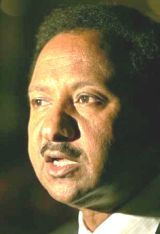Sudan cautiously optimistic on UK new Darfur initiative
May 04, 2008 (LONDON) — The Sudanese government described talks held with UK officials last week as “frank, transparent and constructive”.
 The Sudanese presidential adviser Mustafa Ismail told Sudan official news agency (SUNA) said the discussions in London were “positive” and that it tackled bilateral relations, implementation of Comprehensive Peace Agreement (CPA) and Darfur crisis.
The Sudanese presidential adviser Mustafa Ismail told Sudan official news agency (SUNA) said the discussions in London were “positive” and that it tackled bilateral relations, implementation of Comprehensive Peace Agreement (CPA) and Darfur crisis.
But Ismail cautioned that “it is too early to jump to the end of these discussions since we are in the beginning of the road”.
The UK Foreign Secretary, David Miliband, and the Secretary of State for International Development, Douglas Alexander, met last week with the Sudanese Foreign Minister, Deng Alor, as part of a delegation that included Ismail.
Ismail said that the talks with the British government will continue in Khartoum at an unspecified date.
During the meeting the Foreign Secretary and Secretary of State for International Development, pressed Deng Alor on the UK’s key concerns on Darfur: the security situation and humanitarian access; the urgent need for a cessation of hostilities; more active cooperation from the Government of Sudan on the UNAMID deployment.
The British officials further discussed how a cessation of hostilities could help improve prospects for progress in the political process, and how the UK could help.
However the Foreign Office didn’t elaborate on the initiative of the British Prime Minister, Gordon Brown, to host Darfur peace talks. It was expected that they would deliver further details on the issue.
The Sudanese presidential adviser said that it is “premature to say whether we have accepted or rejected the British proposal since we are still in the process of inquiring and evaluating the situation”.
He stressed that his government is committed to the Libyan efforts as well as those of the UN and AU mediators Jan Eliasson and Salem Ahmed Salem.
“We asked about the guarantees they [UK] received of a change in position by the rebel groups regarding the boycott of the peace talks”.
Abdel-Wahid Al-Nur, leader of Sudan Liberation Movement (SLM) urged the British government to discuss with the Sudanese delegation the halt of violence as priority before peace talks.
Al-Nur had requested Britain to respect the resolution of the Five Permanent members of the UN Security Council to stop violence before talks.
The British ministers also urged the Sudanese government to cooperate fully with the International Criminal Court (ICC), which has issued warrants for two Sudanese citizens, accused of war crimes in Darfur in 2003 and 2004.
But Ismail speaking to Al-Jazeera news channel from London over the weekend reiterated his government’s refusal to cooperate with the ICC saying it does not have jurisdiction over Sudanese nationals.
International experts also say more than 300,000 were killed and 2 million have been driven from their homes by the conflict in Darfur, a region that is roughly the size of France.
(ST)
